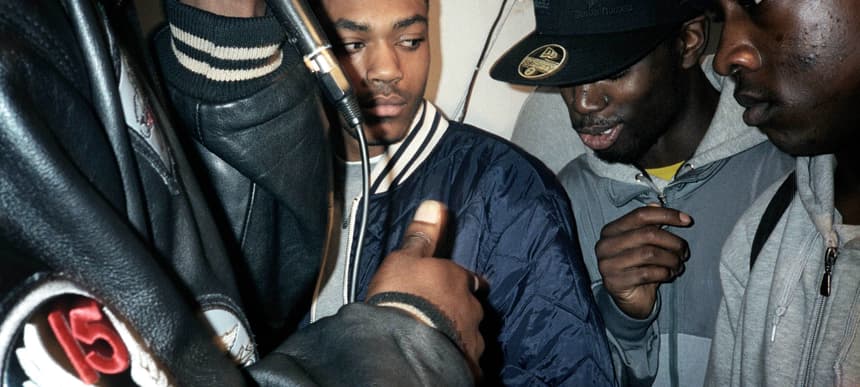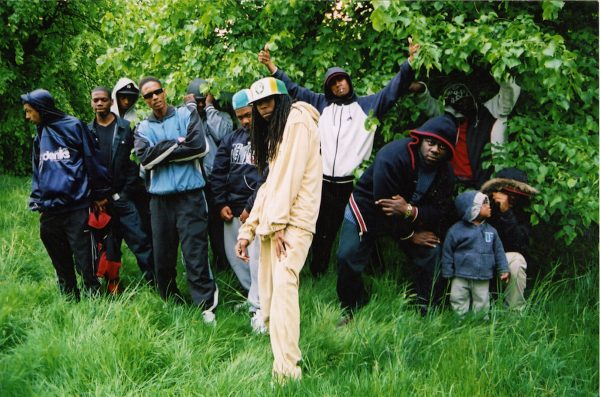
The Dummy Guide to Kano
At a time when rappers hold the same cultural significance as the rockstars of the past, the rap scene that was once sidelined and stifled by mainstream culture now dominates it.
The emergence of grime in the late 1990s/early 2000s was the start of a scene thats influence would percolate further than anyone could have imagined during its inception. Characterised by syncopated breakbeats and a jagged, electronic sound, the raw sense of identity and pride that coursed the veins of the music has gone on to pave the way for a new wave of UK artists with help from pioneers such as Skepta, Dizzee Rascal and Wiley.
Firmly among the inner core of MCs who have contributed to bringing the sounds of the underground to the masses is East Ham artist Kano. The 34-year-old has enjoyed an illustrious career, releasing a number of thought-provoking records that transgress genre boundaries while carving out a unique, evolving sound that has allowed the scene to progress instead of stagnating as a relic of the past.
With the release of new album ‘Hoodies All Summer’, we’re guiding you through the life of the UK legend whose presence in our ears and on our screens has served to build a solid foundation for a new generation of creatives.
Kano was born as Kane Brett Robinson in East Ham, London, and raised by his mother who worked as a PE teacher at a local school. Clearly a switched-on child, the rapper-to-be first showed an abundance of talent as a footballer, having trials for Chelsea FC and Norwich FC before eventually losing interest in what could have been. Having gained nine GCSEs at school despite little to no revision, before going on to attend Greenwich University to study Graphics, however he dropped out in pursuit of a passion that would stick with him for life: music.
Growing up in East London during the nineties, a young Kano took interest in a new underground sound that was slowly bubbling up to the surface: an exciting, high-octane evolution of UK garage and jungle that was to shortly become known as grime. The hype around this new breed of music proliferated throughout the streets, with rap battles, homemade mixtapes and illegal raves all growing in stature as this new culture took a hold on the capital.
Music was entrenched in Kano’s family, so when his mum bought his brother a set of decks, Kano instantly began to hone his freestyle ability to spit over his brother’s garage tunes – a skillset that unknowingly at the time would carve the path for his future career.
Labelled ‘Kano’ by his friends (a reference to a video game character from the Mortal Kombat series that used to rip out his opponent’s heart), he tried to think of another MC title outside of this playful nickname, but this ended up being the one that stuck.
A few years after first picking up the mic, Kano recorded the song ‘Boys Love Girls‘ from the comfort of his own bedroom. After showing the raw recording to a young Dizzee Rascal, the East Ham MC took the advice of his friend and touched up the DIY track in a professional studio, subsequently leading to it being his first-ever single. The song proved a local success and earned heavy airplay on iconic pirate station Deja Vu, helping him gain respect within the community and earning him a place in one of grime’s elite collectives: N.A.S.T.Y Crew (Natural Artistic Sounds Touching You).

Widely considered as the pioneers of grime, N.A.S.T.Y. Crew were an East London group founded by Marcus Nasty that boasted an impressive lineup of some of the scene’s biggest names such as Kano, Jammer, D Double E, Footsie, Monkey, Stormin, Mak 10, Sharky Major and Hyper.
The crew had the headline spot on Deja Vu, performing sets every Monday from 8pm-10pm and featuring special guests like Wiley and Dizzee. The collective are still shrouded in a sense of mystery, from reasons as to why certain people were disbanded from the group, to whether or not people were even in the group to begin with – however one aspect that is largely agreed on is that the crew were some of the original founders of grime music as we know it today, with early cuts like ‘Take You Out’ utilising the distinctive angular instrumental and aggressive lyricism that has come to categorise the genre.
2004 saw Kano represent N.A.S.T.Y Crew in an iconic clash between himself and Wiley for the first-ever Lord of the Mics battle.
The vintage video shot in the graffiti-plastered staircase has earned its place within grime legend with the pair of (now youthful-looking) MCs deploying an onslaught of technical wordplay, presumably unaware of the cultural impact each of them would one day have for pursuing their passion.
The Lord of the Mics series went on to become a fabled event in grime, producing some of the most prestigious clashes to date such as the bout between Skepta and Devilman, while also helping the whole scene to spread in popularity.
Shortly after signing a record deal with 679, Kano decided to leave N.A.S.T.Y. Crew in a bid to focus on launching a solo career. Despite rising up through the ranks of pirate radio and backstreet clashes, the rapper felt like he never properly fit in within the traditional grime scene. Slower tempo tracks that had an element of social commentary were what Kano gravitated towards, made after long days of pirate radio shelling. He was sometimes embarrassed to show his peers this new direction he was taking.
On June 27th 2005, he released debut album ‘Home Sweet Home’, earning gold status in the UK and receiving a flurry of positive reviews from critics and fans alike. The 16-track record was vastly different from anything other ‘grime’ releases at the time, with the production favouring a slower and toned-down approach, rather than the cut-throat synthesised effects that had become synonymous with the genre previously. Precise use of multi-syllabic rhyming schemes on the LP demonstrated Kano’s silver-tongued lyricism upon release and proved that less can definitely mean more.
Although this was the first release in what would prove to be a long and fruitful career for the London MC, the versatility and drive to pioneer new sounds that has come to define Kano’s legacy is fully on display with ‘Home Sweet Home’. Hit single ‘P’s and Q’s’ featured a quicker tempo and animated lyrics, and now stands as one of the MCs most recognisable cuts.
Across ‘Home Sweet Home’s tracklist, Kano has no problem exploring different subject matters and styles while maintaining a level of balance throughout, bringing a sense of maturity to the album. Futuristic collaborations with Mike Skinner and Leo the Lion on ‘Nite Nite’ and Ghetts on ‘Typical Me’ serve to experiment with the traditional values of grime by mixing it with alien genres.
Despite the highly acclaimed artistic success of ‘Home Sweet Home’, the album was by no means a mainstream hit and was never granted a full release in the US. So when it came to producing the follow-up LP, Kano found himself stumbling at the same hurdles that many artists encounter when it comes to continuing the momentum from their debut release: do they continue exactly where they left off or do they try a new approach?
Two years after the release of his debut record, ‘London Town’ arrived. The eleven-track LP articulated the visceral stresses and angst brought on by growing up and living in the streets of London. Opener ‘The Product’ kicked proceedings off with a corrosive and menacing sound, introducing listeners to the grittiness of life in the capital. Lyrics surrounding gun violence take hold on the opening two tracks, and, with those darker, intimidating sonics, ‘London Town’ positioned itself as something of a photo negative of ‘Home Sweet Home’.
The album, though, never quite reached those exciting expectations. As the album progresses, the scatter-gun approach that had been taken when constructing the sophomore record came to fruition more and more. When comparing the caustic sound of ‘The Product’ to the soothing piano rooted ‘Sleep Tight’, it would be hard to imagine the two would exist on the same project if you hadn’t already known. Where ‘Home Sweet Home’ found a perfect balance of styles and tempos, ‘London Town’ was jaded by an attempt to portray a gritty representation of inner-city life while also offering hits tailored to the mainstream.
Tracks like ‘Feel Free’ featuring Damon Albarn and ‘Me And My Microphone’ starring Kate Nash are some of the album’s efforts at branching out into different genres and fanbases, however unlike the pioneering tracks such as ‘Nite Nite’ off the previous record, these ones felt somewhat more “factory” produced.
‘London Town’, though, is by no means a bad album. Around 2007, grime was going through a transformative period, trying to work out its place within the onslaught of mainstream stardom. Many artists from the underground scene were given the option to stick or twist, with the idea of adapting to suit the masses more lucrative than being swept under the carpet by the ever-changing landscape of the music industry.
Amongst the glossy and polished attempts at radio play and commercial success on the record, the socially aware and lyrically dexterous Kano still remained firmly in place – the eleven tracks serving to navigate through a transitional phase for himself and the culture, which was done to expand and improve his craft over any quick financial gain.
After parting ways with 679 in 2008, Kano addressed the claims made by some that he had turned his back on the scene by dropping third album ‘140 Grime Street’ – a 16-track showcase of brooding synth hits and momentous drums that reaffirmed his position of power within the grime community and proved his loyalty didn’t lie elsewhere.
The tracklist enlisted powerful features from Wiley on ‘Anywhere We Go‘, Skepta on ‘These MCs‘ and Ghetts on ‘Hunting We Will Go‘; serving to show the world that when he wants to, Kano can turn on his elite grime presence like a tap.
The autobiographical ‘Aim For The Sky‘ intricately described Kano’s rise to commercial prominence, with lyrics like “Done a lot for the scene, so ungrateful they seem / I fly the flag for the UK from the MOBOs right to the B.E.T / I got no time for haters you know, KA’s just doing his thing,” responding directly to attacks in his usual tight-flowed vivacity.
In a year where the genre was becoming increasingly diluted and influenced by the pull of mass appeal, Kano stripped the music back to its core essence and gave the community what they were so desperately aching to hear, with the release to many representing grime’s prodigal son returning home.
Aside from being a prestigious MC, Kano has fought hard throughout his career to break free from the shackles of labels, wanting to be part of the bigger picture and considered as a versatile and multi-faceted “artist”. After the all-guns-blazing ‘140 Grime Street’, his next album was to underscore his versatility more than any other project in his life at that point, experimenting heavily with electronic influences and new vocal styles.
‘Method To The Maadness’ dropped on August 30th 2010, marking the rapper’s fourth studio album and his most eclectic body of work for the time. Fresh off a collaboration with the Gorillaz on their album ‘Plastic Beach’, the East Ham rapper was intrigued and inspired by new sounds, bigger concepts and bolder ideas more than ever before, and having perviously proved his deep-rooted grime ability will never leave him on his previous record, he felt it was time to dabble in uncharted territory.
The album boldly leapt into an unconventional blend of grime, hip-hop, dubstep and indie rock, resulting in a sound that was not just new to Kano but new to everyone.
Collaborating with electronic pop group Hot Chip on ‘All + All Together’, the cut served as a real standout track on the record, delivering a futuristic yet mature sound that boasted all the elements of an artist who was eagerly learning and developing his craft. Among the intricacy of the album, songs like ‘Get Wild’ featuring Wiley and Aidonia added riot-inducing flare, while ‘Slaves’ effectively utilised the electric guitar to back up Kano’s ever-conscious lyricism.
‘Method To The Maadness’ was never made to please everyone. Being his least ‘grimey’ album to date, this record signified a big step out of his ‘140 Grime Street’ comfort zone, and although not every track on the record will shut down the party, the time and consideration put into the construction of these songs was clearly apparent.
Taking some time out from music, Kano travelled the world before coming back to the UK to star in a new Channel 4 crime drama series called Top Boy. The rapper had dabbled in acting before, appearing in the 2006 film Rollin’ with the Nines which followed a group of friends trying to set up a successful garage act in order to leave their previous lives behind, however his new role would have a much greater cultural impact.
Kano played the role of Sully, a rising drug dealer in the fictitious Summerhouse housing estate who, with his partner Dushane, must make a series of tough decisions to stay alive and in business.
Top Boy was an on-screen sensation. Never before had the gritty street life of London been portrayed on mainstream TV in such an accurate and harrowing way, and for viewers and actors alike, the series made headway in representing this kind of culture in the media. Kano was eager to get involved with the project in an attempt to shine a light on a segment of society that had mostly gone under the radar for a long time, with the message he had been trying to spread in his music for years now open to flourish on national television.
The show stalled following the finale of the second season and it started to seem as though the street drama might never return to our screens. However after Netflix uploaded the show to their service, a large amount of hype started to gather around the series again and what used to be a national success became an international attraction.
One of the big names attracted to the series was none other than Drake, who liked it so much that he decided to revive the show from the ashes; funding a third, ten episode season in collaboration with Netflix which he became executive producer of. Kano is set to star once again in the forthcoming instalment, with other familiar faces from the music industry including Dave and Little Simz also having pivotal roles. The new season is set to release on the 13th of September 2019.
It had been six long years since the release of ‘Method To The Maadness” and grime was in full throttle. The scene had come a long way since Kano had last put out a full body of work, and thriving off of the foundations he and other MCs had laid down over the last ten years, a new wave of young artists were taking the world by storm, racking up millions of views worldwide.
Fifth album in Kano’s artillery, ‘Made In The Manor’, once again pushed back against the conventions of the time. Grime was now living in the modern age of YouTube hits and Spotify streams, with MCs desperately rushing to land upon the next viral song while rising up against the fray of major labels.
Kano on the other hand, had a deeply intimate and meticulously polished 15-track project at the ready which he was debating not releasing at all, abstractly mirroring the pre-release anxieties of his very first record ‘Home Sweet Home’. When the record did drop, though, the depth and eclecticism of the project quickly became clear and the East London MC, 30 at the time of release, put to bed any doubts of his return; showcasing that he was still the most introspective and perceptive rapper in the game.
The project effortlessly transitions from periods of bravado and swagger on tracks such as ‘GarageSkankFREESTYLE’ and ‘3 Wheel-Ups’ to touching and emotional reflections on broken relationships and long lost relatives on ‘Little Sis’ and ‘Strangers’.
The video for ‘Hail’ cost just £35 to create, mostly due to the fact that Kano directed, filmed, and edited the video completely off his own back, a small touch towards proving the rapper’s care and work ethic that went into the Mercury award-nominated personal project.
Where some artists aim for the chart scaling hits and viral singles, Kano has always opted for producing full projects that can fit in his multiple dimensions and inner thoughts a single track could simply never portray. The album specialist has created some of the finest bodies of work the streets have seen, with ‘Home Sweet Home’ and ‘Made In The Manor’ perfect examples of music expertly crafted with elements of touching social-commentary and explosive flare.
New album ‘Hoodies All Summer’ amalgamates the work and experience acquired over and long and fruitful career to produce his most important project yet. The ten-track record raises the bar another level with an artistic vision aiming to capture the social zeitgeist of Britain in the modern age; working as a mouthpiece for the black British working-class youth.
Standout track ‘Trouble‘ highlights the failure of politicians and the aching disparity between the poorest in society to those in power. The immersive track was released with a short film depicting the reality of knife violence on the streets and the detrimental effect it has on all involved.
As well as the deep and thought-provoking meaning behind the new record, musically the album also impresses. Being one of Kano’s shortest projects, an element of fluidity is maintained throughout, with the momentum rarely slowing down or losing impact.
‘Class of Deja‘, featuring D Double E and Ghetts, provides a flashback to the Deja Vu days with a powerful and energetic number that would fancy itself the best grime track of the year, while ‘Can’t Hold Me Down’ flaunts its Jamaican influences with a galvanising party melody.
Kano isn’t scared off or intimidated by his status as one of the best in the game and has enjoyed backing up these claims time after time throughout his lifetime. A boy from Newham who rose to the top of the pile during the emergence of grime, the rapper has since spread his wings and developed his tastes and styles. Aside from the music, his work on our screens has highlighted areas of our society that was once ignored and has helped towards building a solid and structured pathway for people out of the ends.
Despite his accomplishments and stature, the London boy has never forgotten his roots and has dedicated his life to spreading awareness and portraying the reality of the environment he is a product of, making it safe to say that Kano is truly a legend for the culture.
Stream ‘Hoodies All Summer’ here.













